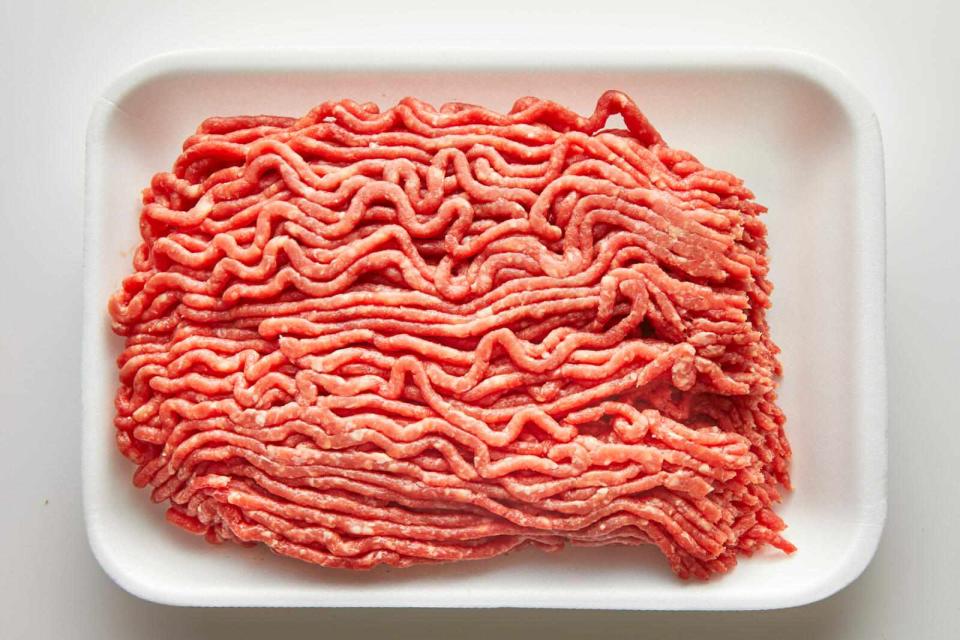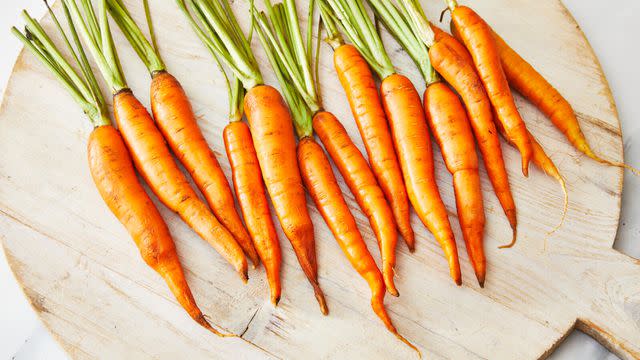Foods You Should Never Store Together, According To An Expert
It's time to take your kitchen knowledge up a notch.

Caitlin Bensel; Food Styling: Torie Cox
Rising grocery prices means most of us would like to preserve every single item bought at the grocery store or farmers market as long as possible. One way to do this is figuring out which foods, specifically fruits and vegetables, should not be stored together in order to extend shelf life.
If you've got kitchen organization down, it's time to consider what foods shouldn't be stored together. When it comes to food storage, it can be tricky to remember what is safe and what is not, especially when you're trying to stretch your grocery budget.
Expert
Molly Gordon is a chef and culinary instructor in Charleston, South Carolina
Raw Meat/Poultry With Produce
When it comes to storing items in the refrigerator, it can be tricky figuring out where the best place to store items like raw meat or poultry, particularly if you're keeping them away from other food items. "Raw meat or poultry should never be stored alongside fresh vegetables or fresh fruit," Molly Gordon, a chef in in Charleston, South Carolina, tells Southern Living, adding that the best place to store raw meat is below any ready-to-eat foods to avoid contamination.
Mushrooms With Onions Or Garlic
Because mushrooms are categorized as a fungi, they are very porous. In the kitchen, this means they can (and will) absorb odors from nearby food. "If you store mushrooms near onions or garlic, your mushrooms are going to taste like onions and garlic," Gordon explains, adding mushrooms should be stored in a paper bag for best taste.
Spices
It may seem like common sense, but only spices should be stored in your spice cabinet. "Keep spices separate in a cool, dark cabinet," Gordon says. "I wouldn't recommend storing spices above your stove, because heat rises. You want to keep them cool and dry."
Ethylene Producers With Ethylene Sensitive Produce
Produce is one of the more expensive grocery items, so it's important to recognize what can be stored together and what cannot. Part of that is recognizing which food items are ethylene producers and which produce is ethylene sensitive.
"Things like avocados and apples exude ethylene gas," Gordon explains. "So you don't want to put apples next to lettuce, for example, because the ethylene gas is going to make the produce that it's sitting next to ripen super quickly."
What Is Ethylene?
Ethylene is a gas released by some fruits and vegetables that causes produce to ripen faster. Therefore, you do not want to store produce that is sensitive to ethylene with or near those that produce it.
Ethylene producing produce includes:
Avocados
Apples
Bananas
Peaches
Cantaloupes
Kiwis
Pears
Tomatoes

Caitlin Bensel; Food Styling: Torie Cox
Ethylene sensitive produce includes:
Broccoli
Collard Greens
Cucumbers
Eggplant
Onions
Lettuce
Peaches
Gordon says that consumers can sometimes use ethylene to their advantage. "It's great if you want to ripen things up super quickly," she says. "But if you don't, avoid putting sensitive produce next to ethylene producing produce."
Human Food With Other Supplies
Gordon says that it is important to keep human food stored away from anything meant for animals, or any non-food items, like cleaning supplies. "Anything that is not edible should not go into your cabinet," she says, adding that consumers should have a separate cabinet for non-edible items, like scented trash bags or dish soap. "I would also keep dog food away from animal food. Human consumption in one cabinet and everything else in another."
For more Southern Living news, make sure to sign up for our newsletter!
Read the original article on Southern Living.

